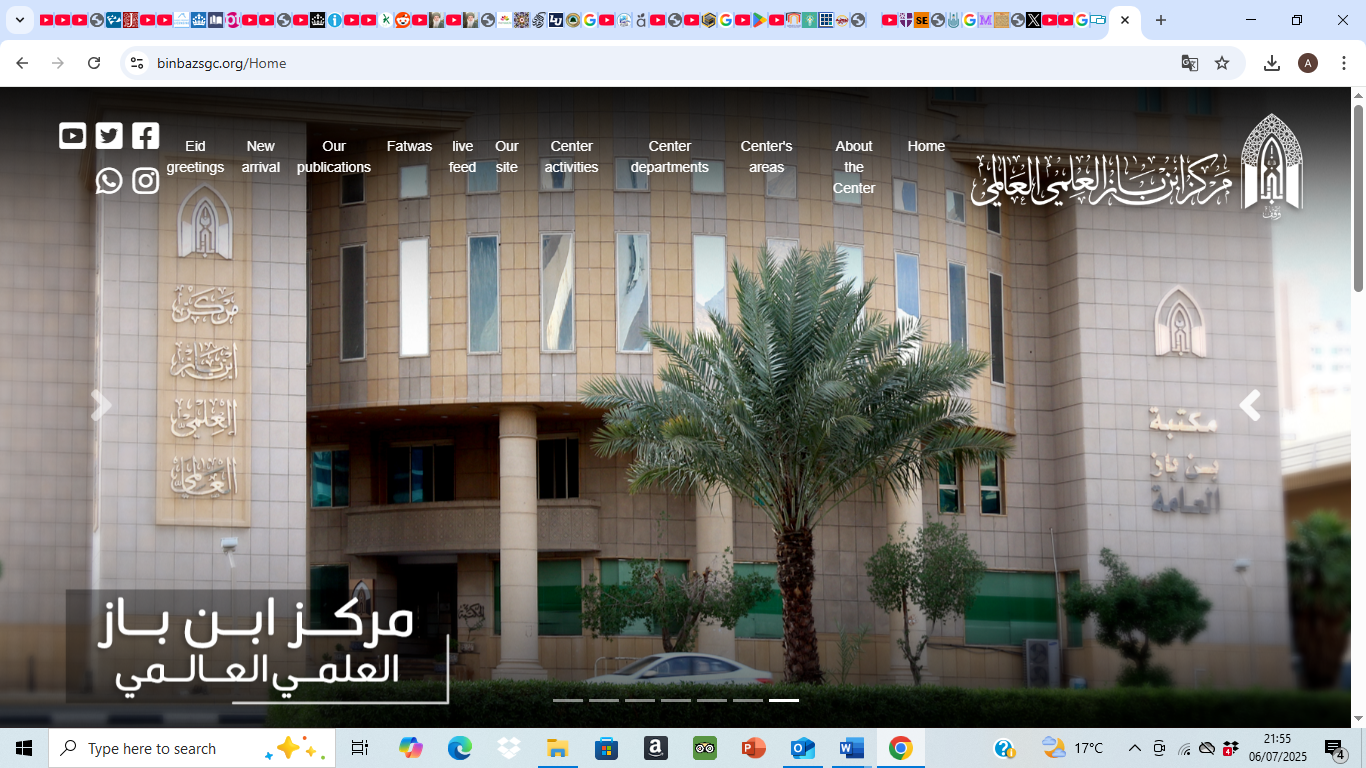
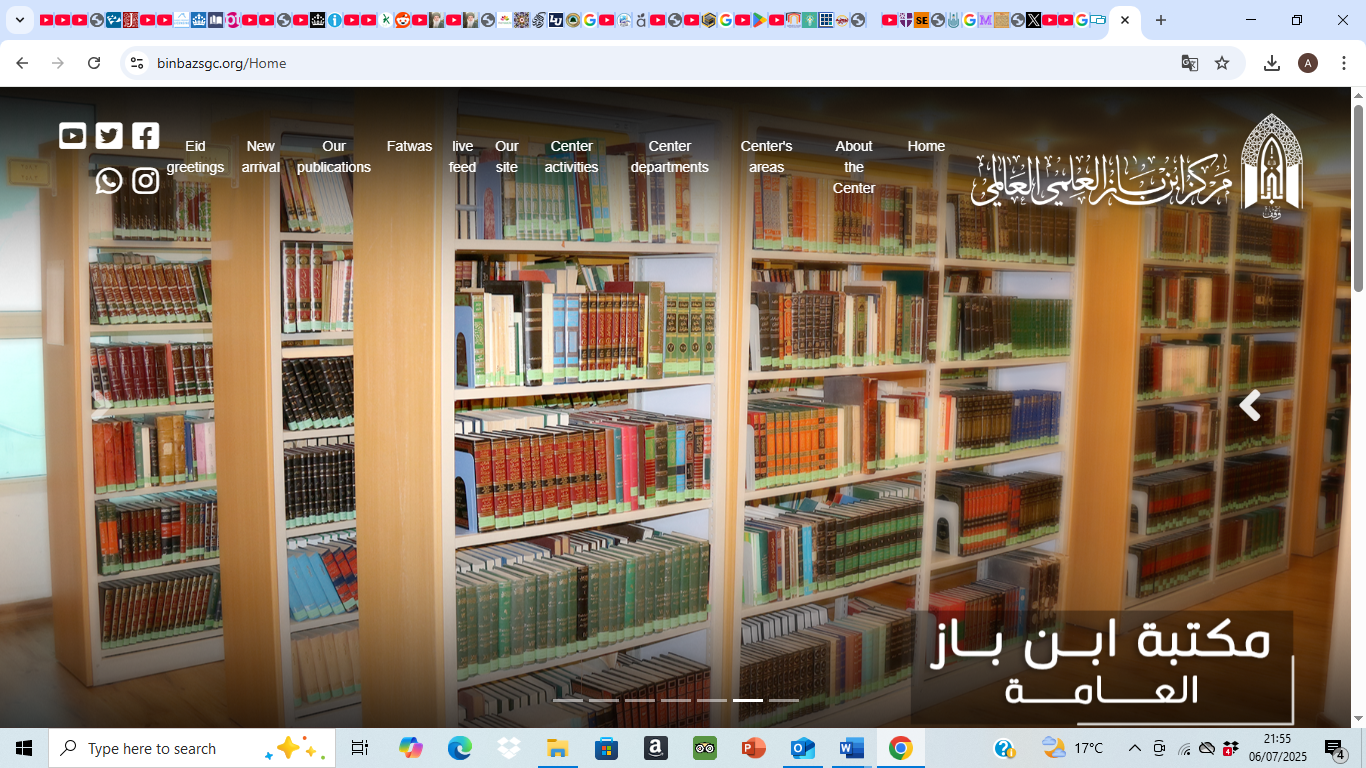
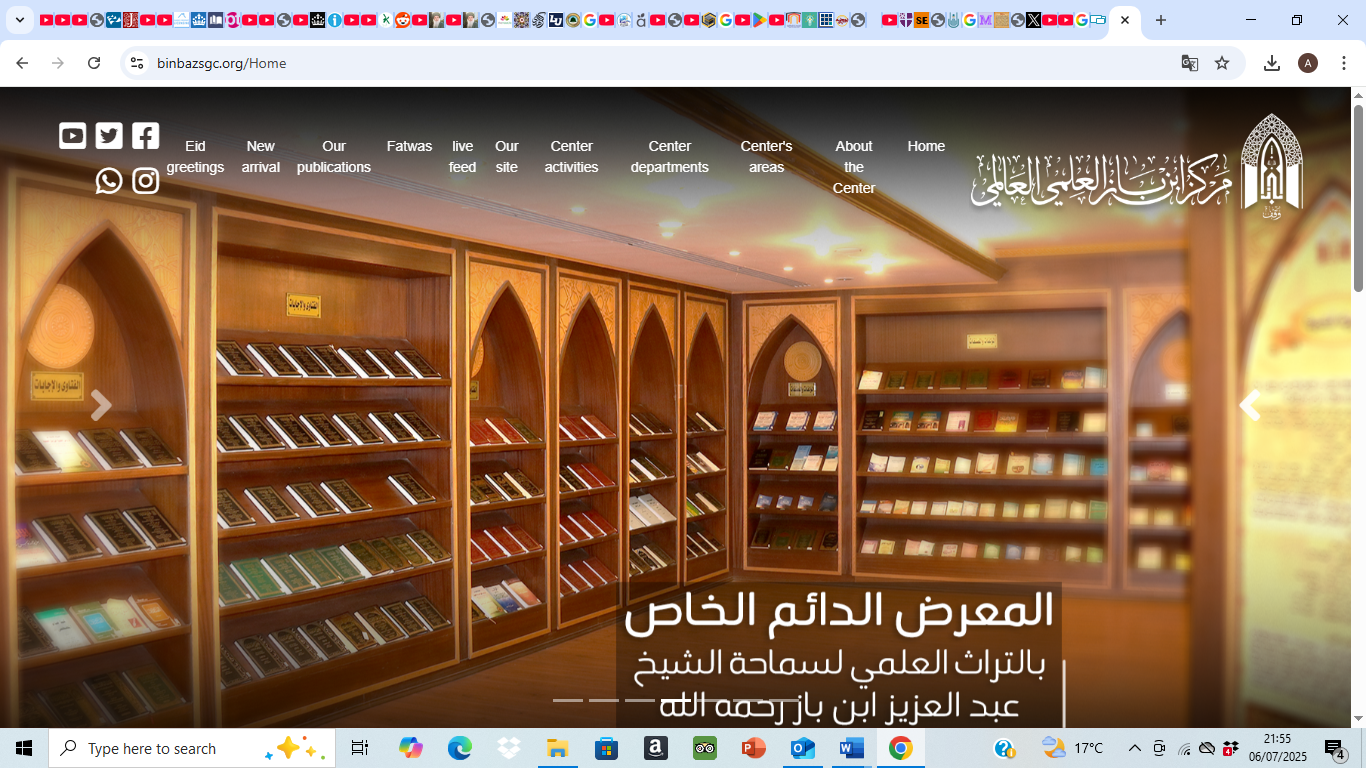
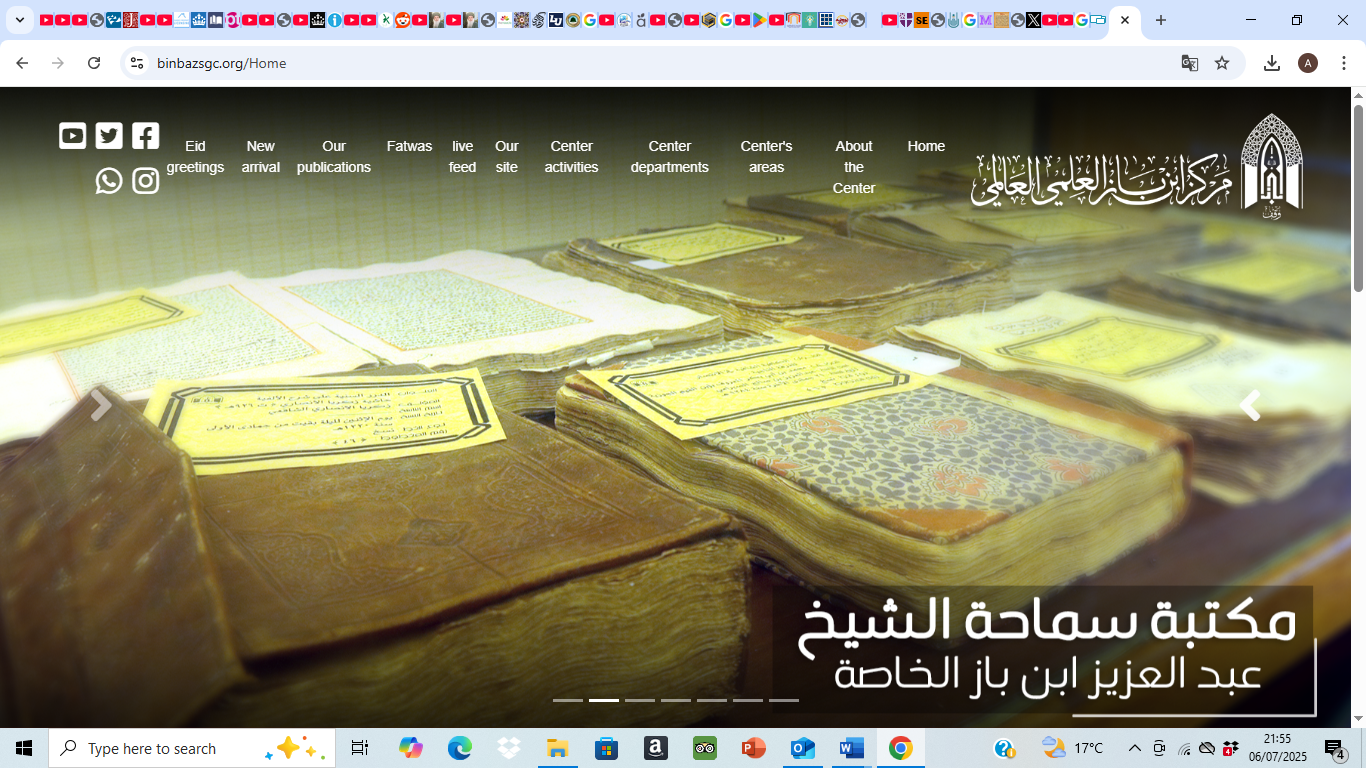
from:
https://binbazsgc.org/Home
https://binbazsgc.org/Home
Google:
The image shows the Sheikh Abdulaziz bin Baz Mosque and its associated facilities, including the Ibn Baz Public Library, located in Mecca, Saudi Arabia.
- Sheikh Abdulaziz bin Baz Mosque:
- This mosque is a significant religious site in Mecca, known for its imposing architecture and its role in local religious practices and education.
- Ibn Baz Public Library:
- The image also shows the Ibn Baz Public Library, indicating a focus on religious education and resources related to the teachings of Sheikh Abdulaziz bin Baz.
- International Center for Ibn Baz:
- The building is part of a larger complex, likely including the "International Center for Ibn Baz" , which suggests a broader mission related to the legacy and teachings of the prominent Islamic scholar, Sheikh Abdulaziz bin Baz.
############
The Ibn Baz Library refers to the personal collection of books and manuscripts amassed by Sheikh Abdul-Aziz ibn Abdullah ibn Baz, a prominent Islamic scholar and Grand Mufti of Saudi Arabia. He is also known as Sheikh Bin Baz. His library primarily contained Arabic manuscripts and focused on Islamic subjects like the Quran, Hadith, Fiqh (Islamic jurisprudence), and Tafsir (Quranic exegesis).
Key aspects of the Ibn Baz Library:
- Content:
- The library contained a vast collection of Arabic manuscripts, reflecting Ibn Baz's deep knowledge and interest in Islamic sciences.
- Significance:
- The library provides insight into the scholarly pursuits and intellectual interests of a leading Islamic figure of his time.
https://shiawaves.com/english/news/world/7626-egypt-to-remove-books-of-ibn-taymiyyah-ibn-baz-and-ibn-uthaymeen-from-all-mosques/
Egypt to remove books of Ibn Taymiyyah, Ibn Baz and Ibn Uthaymeen from all mosques
June 13, 2019
The Egyptian Ministry of Religious Endowments have launched a campaign to remove the books of “scholars” that belong to the Salafi movement from all mosques in Egypt.
Names of “scholars” whose books are to be removed or confiscated:-
– Muhammad Ibn Abdul Wahhab
– Ibn Taymiyyah
– Ibn Baz
– Ibn Uthaymeen
– Abu Ishaq al-Huweini
– Mohamed Hussein Yacoub
– Mohammed Hassan
They have already confiscated 7000 books and CDs from mosque libraries in Cairo, Alexandria and Giza.
The ministry’s department is currently launching an inspection campaign on mosques and libraries in all provinces, to make sure they are free of any books and media calling for “militancy and extremism”.
https://shiawaves.com/english/news/world/7626-egypt-to-remove-books-of-ibn-taymiyyah-ibn-baz-and-ibn-uthaymeen-from-all-mosques/
https://binbazsgc.org/Home/WhoAreWe
https://binbazsgc.org/Home/WhoAreWe
The center was established in 1426 AH. It is one of the scientific centers in Makkah Al-Mukarramah, which is concerned with general culture and preserving the moderate Islamic approach. The center’s geographical location is of great importance, as it is located between the Grand Mosque and the holy sites, with a total area of (1070 m2) on the main Aziziyah Street and the intersection of the pedestrian bridge leading to Mina. More important than its geographical location is its religious and spiritual location and its connection to one of the flags of science and knowledge in the modern era, the divine Imam Sheikh Abdul Aziz bin Abdullah bin Baz, may God have mercy on him.
####
Center location
Kingdom of Saudi Arabia
Mecca - Azizia
Near the mosque of His Eminence Sheikh Abdul Aziz bin Baz, may God have mercy on him
#####
m. the centre has 4 key areas:
-Ibn Baz Public Library
-The private library of His Eminence Sheikh Abdul Aziz bin Baz
-The permanent exhibition of the scientific heritage of His Eminence the Sheikh, may God
have mercy on him
-Residential tower
Ibn Baz Public Library
Ibn Baz Public Library is one of the landmarks of Makkah Al-Mukarramah. It was established at the behest of His Eminence Sheikh Abdul Aziz Ibn Baz, may God have mercy on him.
The library's distinction lies in the people behind it. The library's honor and scholarly strength were increased by the Sheikh's will, may God have mercy on him, to add his own private library, which he selected and chose, given his high standing in knowledge, to the library's collection. In addition to that, the library is distinguished by its important location and suitable environment, in which all the library's data and more are combined, as it is considered the closest library to the Holy Mosque, and is located in the middle of the road between the Grand Mosque and Umm Al-Qura University in Al-Aziziyah.
The library occupies three full floors and contains more than thirty thousand titles in more than fifty thousand volumes, all of which have been indexed and classified according to the latest indexing systems. It is equipped with public and private reading rooms.
The library contains major scientific books, sources, and references that are indispensable to researchers and students of knowledge. It also contains a number of scientific dissertations and a valuable collection of scientific magazines and periodicals that are full of articles on Islamic law, linguistics, literature, and history.
It is open all days of the week except Friday, from 8 am to 11 pm.
Ibn Baz Public Library is frequented by all segments of society and all educational levels, benefiting from the services it provides. The number of beneficiaries reaches approximately 10,000 annually.
The beneficiaries range from lecturers, academics, and students from Umm Al-Qura University and prestigious scientific institutes in Makkah, such as the Makkah Haram Institute and Dar Al-Hadith Charity, to middle and high school students, among other beneficiaries.
Since its opening in the basement of Ibn Baz Mosque, it has witnessed a great turnout for the valuable and important scientific sources it contains, which researchers and students of knowledge cannot do without. The total number of beneficiaries of the library during that period reached (10,000) beneficiaries before the library was moved to its new location.

The private library of His Eminence Sheikh Abdul Aziz bin Baz
Before his death, His Eminence Sheikh Abdul Aziz bin Baz, may God have mercy on him, recommended that Dr. Nasser Al-Zahrani take charge of his scholarly heritage, including libraries, sources, and books, and transfer them to Makkah Al-Mukarramah, where he would take care of them and supervise them. His Eminence carried out this recommendation and devoted great care to this library.
His Eminence's library - may God have mercy on him - contains rare copies of books, some distinguished manuscripts, and a large number of sources and references of historical value. A separate hall has been designated for this purpose, and all the books contained in this library have been indexed, so that students of knowledge can benefit from them, and they do not remain confined to shelve

The permanent exhibition of the scientific heritage of His Eminence the Sheikh, may God have mercy on him
The administration of the Ibn Baz Scientific Center has given great attention to the works of Sheikh Abdul Aziz Ibn Baz, may God have mercy on him, and has allocated a separate hall for them, to be a permanent exhibition that includes all the works of the Sheikh, may God have mercy on him, and what was written about him, whether they are books, periodicals, scientific letters, or audio or visual materials. A special corner has been equipped for reading and browsing by individuals and persons authorized by the library administration.

Ibn Baz Public Library
Ibn Baz Public Library is one of the landmarks of Makkah Al-Mukarramah. It was established at the behest of His Eminence Sheikh Abdul Aziz Ibn Baz, may God have mercy on him.
The library's distinction lies in the people behind it. The library's honor and scholarly strength were increased by the Sheikh's will, may God have mercy on him, to add his own private library, which he selected and chose, given his high standing in knowledge, to the library's collection. In addition to that, the library is distinguished by its important location and suitable environment, in which all the library's data and more are combined, as it is considered the closest library to the Holy Mosque, and is located in the middle of the road between the Grand Mosque and Umm Al-Qura University in Al-Aziziyah.
The library occupies three full floors and contains more than thirty thousand titles in more than fifty thousand volumes, all of which have been indexed and classified according to the latest indexing systems. It is equipped with public and private reading rooms.
The library contains major scientific books, sources, and references that are indispensable to researchers and students of knowledge. It also contains a number of scientific dissertations and a valuable collection of scientific magazines and periodicals that are full of articles on Islamic law, linguistics, literature, and history.
It is open all days of the week except Friday, from 8 am to 11 pm.
Ibn Baz Public Library is frequented by all segments of society and all educational levels, benefiting from the services it provides. The number of beneficiaries reaches approximately 10,000 annually.
The beneficiaries range from lecturers, academics, and students from Umm Al-Qura University and prestigious scientific institutes in Makkah, such as the Makkah Haram Institute and Dar Al-Hadith Charity, to middle and high school students, among other beneficiaries.
Since its opening in the basement of Ibn Baz Mosque, it has witnessed a great turnout for the valuable and important scientific sources it contains, which researchers and students of knowledge cannot do without. The total number of beneficiaries of the library during that period reached (10,000) beneficiaries before the library was moved to its new location.

M. The library has a income generatig stream attached, to ensure it has a continous income to maintain the library and its functions, unlike the Birthplace, which has been left to deteriorate, and oly given a coat of paint and minimal repairs once it became an eyesore visible to millions of pilgrims visiting each year:
Residential tower
It is an investment project whose revenues go to the center, as one of its main objectives is to have an infrastructure for sustainable development to ensure that the center carries out its tasks and the role required of it
https://www.visitsaudi.com/en/makkah/attractions/sheikh-abdul-aziz-bin-baz-mosque
Sheikh Abdul Aziz bin Baz Mosque
A spiritual landmark in the heart of Makkah
About Sheikh Abdul Aziz bin Baz Mosque
Located near the Holy Mosque, Sheikh Abdul Aziz bin Baz Mosque is one of the largest and most prominent mosques in Makkah. Named after one of the Kingdom’s most respected scholars, the mosque is known for its vital role in community life, offering a space for worship, religious learning, and reflection.
Its proximity to key religious sites makes it a peaceful stop for visitors looking to deepen their spiritual journey while experiencing the vibrant rhythm of the city.
Why Visit?
Prime Location: Just minutes from Al Masjid Al Haram, ideal for pilgrims and spiritual seekers.
Religious Significance: Named after a revered Islamic scholar and known for its impactful religious programming.
Welcoming Atmosphere: Offers a serene space for prayer, contemplation, and connection with local culture.
https://www.visitsaudi.com/en/makkah/attractions/sheikh-abdul-aziz-bin-baz-mosque
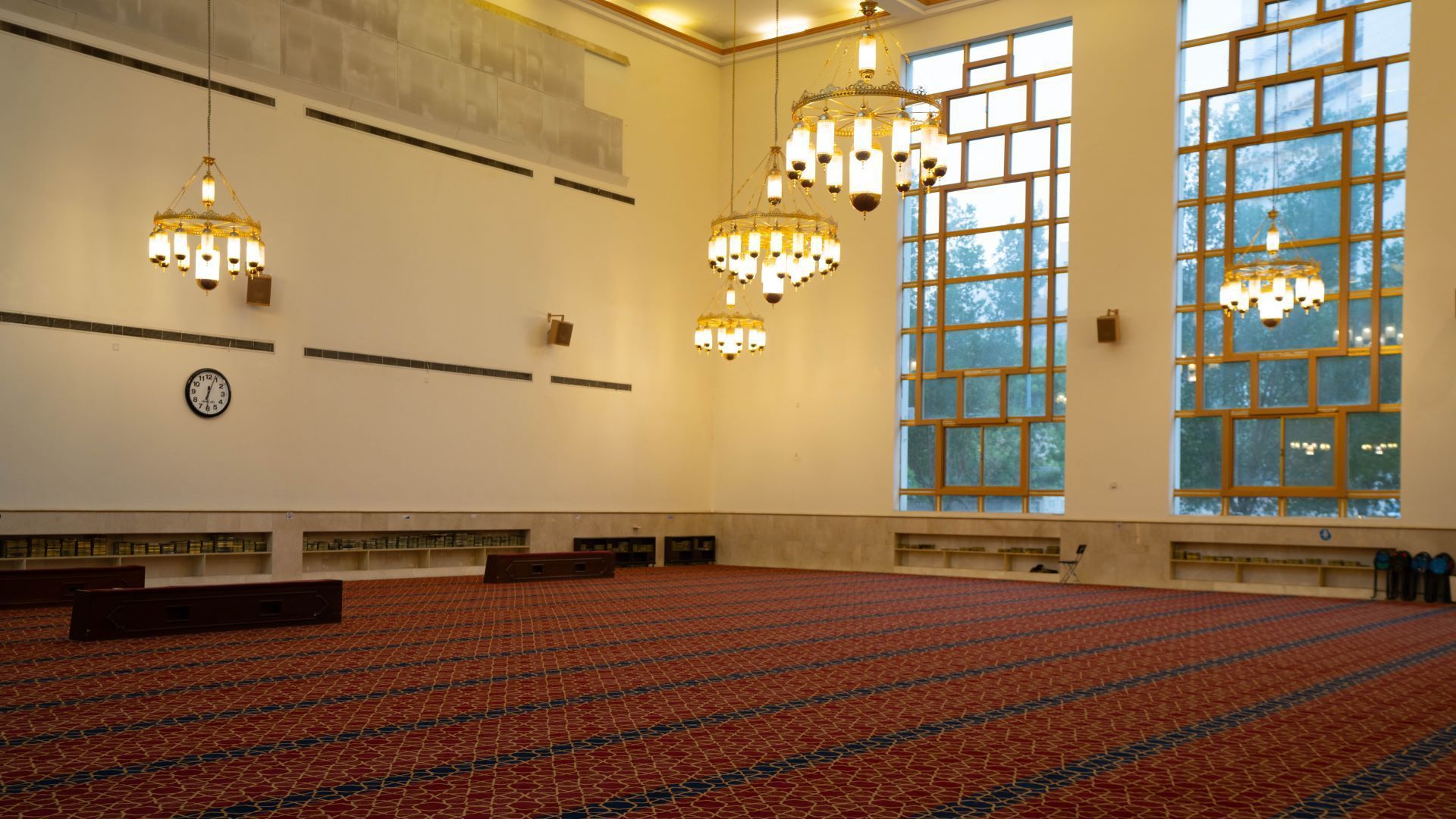
https://nasiralzahrani.sa/en/he-founded-and-supervised-ibn-baz-scientific-global-center/
He founded Ibn Baz Scientific Global Center and supervised it on behalf of His Eminence Imam Abdulaziz bin Baz, may Allah have mercy on him, with the support of King Fahd bin Abdulaziz Al Saud, may Allah have mercy on him; and later, King Abdullah bin Abdulaziz Al Saud, may Allah have mercy on him too, and finally King Salman bin Abdulaziz Al Saud, may Allah support him. It is a center specialized in scientific and cultural activities, and it has the headquarter of His Eminence Sheik Ibn Baz Private Library, which is one of the largest libraries and scientific centers in the Kingdom of Saudi Arabia. The building consists of fifteen floors, and the scientific center takes the first four floors of the building.
https://en.wikipedia.org/wiki/Ibn_Baz
Abdulaziz ibn Abdullah Al Baz (Arabic: عبد العزيز بن عبد الله آل باز, romanized: ʿAbd al-ʿAzīz ibn ʿAbd Allāh Āl Bāz; 21 November 1912 – 13 May 1999), known as Ibn Baz or Bin Baz,[8] was a Saudi Islamic scholar who served as the grand mufti of Saudi Arabia from 1993 until his death in 1999.
###
His influence on the Salafi movement was large, and most of the current prominent judges and religious scholars in Saudi Arabia are his former students.
Controversies[edit]
His obituary in The Independent said "His views and fatwas (religious rulings) were controversial, condemned by militants, liberals and progressives alike".[27]
In 1966, when Ibn Baz was vice-president of the Islamic University of Medina, he wrote an article denouncing Riyadh University for teaching the "falsehood" that the Earth rotates and orbits the Sun.[29][30] In his article, Ibn Baz claimed that the Sun orbited the Earth,[31][32][33] and that "the earth is fixed and stable, spread out by God for mankind and made a bed and cradle for them, fixed down by mountains lest it shake".[33] As a result of the publication of his first article, Ibn Baz was ridiculed by Egyptian journalists as an example of Saudi primitiveness,[34] and King Faisal was reportedly so angered by the first article that he ordered the destruction of every unsold copy of the two papers that had published it.[29][33] In 1982 Ibn Baz published a book, Al-adilla al-naqliyya wa al-ḥissiyya ʿala imkān al-ṣuʾūd ila al-kawākib wa ʾala jarayān al-shams wa al-qamar wa sukūn al-arḍ ("Treatise on the textual and rational proofs of the rotation of the sun and the motionlessness of the earth and the possibility of ascension to other planets"). In it, he republished the 1966 article, together with a second article on the same subject written later in 1966,[35] and repeated his belief that the Sun orbited the Earth.[36] In 1985, he changed his mind concerning the rotation of the Earth (and, according to Lacey, ceased to assert its flatness), when Prince Sultan bin Salman returned home after a week aboard the Space Shuttle Discovery to tell him that he had seen the Earth rotate.[29][37]
In addition, there was controversy concerning the nature of the takfir (the act of declaring other Muslims to be kafir or unbelievers), which, it was claimed, Ibn Baz had pronounced. According to Malise Ruthven, he threatened all who did not accept his "pre-Copernican" views with a fatwa, declaring them infidels.[38] Ibn Baz wrote a letter to a magazine in 1966 responding to similar accusations:
I only deemed it lawful to kill whoever claims that the sun is static (thābita la jāriya) and refuses to repent of this after clarification. This is because denying the circulation of the sun constitutes a denial of Allah (Glorified be He), His Great Book, and His Honourable Messenger. It is well established in the Din (religion of Islam) by way of decisive evidence and Ijma' (consensus) of scholars that whoever denies Allah, His Messenger or His Book is a Kafir (disbeliever), and their blood and wealth become violable. It is the duty of the responsible authority to ask them to repent of this; either they repent or be executed. Thanks to Allah that this issue is not debatable among scholars.[39][40]
Ibn Baz's second article written in 1966 also responded to similar accusations:
I did not declare those who believe that the earth rotates to be infidels, nor those who believe that the sun moving around itself, but I do so for those who say that the sun is static and does not move (thābita la jāriya), which is in my last article. Whoever says so being an infidel is obvious from the Quran and the Sunnah, because God almighty says: 'And the sun runs on (tajri) to a term appointed for it' ... As for saying that the Sun is fixed in one position but still moving around itself, ..., I did not deal with this issue in my first article, nor have I declared as infidel anyone who says so.[35][41]
##
Grand Mosque takeover[edit]
Ibn Baz has been associated with some members of the 20 November–4 December 1979 takeover of the Grand Mosque (Masjid al-Haram) in Mecca. The two-week-long armed takeover left over 250 dead, including hostages taken by the militants. According to interviews taken by author Robert Lacey, the militants, led by Juhayman al-Otaybi, were known as Al-Ikhwan (named after the Ikhwan army that which Juhayman's father served in or the hostel, Beit al-Ikhwan, in which Juhayman lived in).[46] Al-Ikhwan were former students of Ibn Baz and other high ulema under the Al-Jama'a Al-Salafiya Al-Muhtasiba (literally, the Salafi Group that Commands Right and Forbids Wrong"), before breaking off from the group due to their extremism and militantism.[47]
Islam forbids any violence within the Grand Mosque. Ibn Baz found himself in a delicate situation, especially as he had previously taught al-Otaybi in Medina. The situation was compounded and complicated by the fact that the Saudi Government found itself unprepared and incapable of dislodging the militants from the Mosque.[49]
#
When asked for a fatwa by the Government to condemn the militants, the language of Ibn Baz and other senior ulama "was curiously restrained". The invaders of the Masjid al-Haram were not declared non-Muslims, despite their killings and violation of the sanctity of the Masjid, but only called "al-jamaah al-musallahah" (the armed group). Regardless, the ulema (Scholars) issued a fatwa allowing deadly force to be used in retaking the mosque.[50] The senior scholars also insisted that before security forces attack them, the authorities must offer the option "to surrender and lay down their arms".[51]
Ibn Baz has been described as having inflexible attitudes towards women[52] and being a bulwark against the expansion of rights for women.[53] #
He also issued a fatwa against women driving cars, which in the West may have been his most well known ruling.[54] He declared: "Depravity leads to the innocent and pure women being accused of indecencies. Allah (Arabic for God) has laid down one of the harshest punishments for such an act to protect society from the spreading of the causes of depravity. Women driving cars, however, is one of the causes that lead to that."[53]
Bin Baz wielded much power in Saudi Arabia, a conservative state which applies Islamic law and is home to two of Islam's holiest shrines. He ruled on many social aspects of daily life in the kingdom and had the final say on religious issues.
Because Saudi Arabia is a theocratic state, bin Baz's fatwas carried the weight of the law and covered a wide range of issues,
bin Baz in 1976 ruled that the Earth was flat and that it was a great blasphemy to suggest otherwise. His critics often dust off this fatwa in their call for change in the conservative kingdom.
--
Many of Ibn Baz's views and rulings are considered controversial (both inside and outside Saudi Arabia), including those relating to cosmology, women's rights,
https://asharisassemble.com/2013/04/10/ibn-baz-another-heresiography-by-gf-haddad/
bn Baz passed a fatwa that “It is not permissible to celebrate the birthday of the Prophet , in fact, it must be stopped, as it is an innovation in the religion.” His sole proof for this declaring an act illicit and an innovation in Islam is that it did not take place in the early centuries of Islam, whereas al-Shafi`i and the Imams and scholars of the principles of jurisprudence defined innovation in the Religion as “that which was not practiced before AND contravenes the Qur’an and Sunna.” It is noteworthy that the heads of the “Salafi” movement and those of their offshoots who propagate their views are always careful, through ignorance and/or duplicity, to omit this second, indispensable pre-condition in their definition of bid`a: Deobandis, Tablighis, Tahriris, Muhajiris, Jama`is, Ikhwanis, ICNA, ISNA, IANA, MAYA, JIMAS, WAMY, QSS, SAS, IIIE, and other Wahhabis. Furthermore, the majority of the scholars of Ahl al-Sunna – and Allah knows best – concur either outloud or tacitly on the licit character of the celebration of the Mawlid provided the usual etiquette of Islam in public gatherings is kept. Lastly, the Hanbali school in its entirety never declared forbidden the celebration of the Mawlid and even Ibn Taymiyya stated that one who celebrates it with sincere intentions will be rewarded!7
Ibn Baz revived the innovation and invalid fatwa of Ibn Taymiyya to the effect that it is forbidden to travel with the intention of visiting the Prophet in his notes on Ibn Hajar’s Fath al-Bari, book of Fadl al-Salat fi Makka wal-Madina, where Ibn Hajar comments on Ibn Taymiyya’s prohibition of travel for Ziyara: “Ibn Taymiyya said: `This kind of trip – traveling to visit the grave of the Prophet – Allah bless and greet him – is a disobedience, and salât must not be shortened during it.’ This is one of the ugliest matters reported from Ibn Taymiyya.” To which Ibn Baz reacts in a footnote: “It is not ugly, and Ibn Taymiyya was right.” Indeed, Ibn Hajar’s teacher, Zayn al-Din al-`Iraqi, rightly called it in his Tarh al-Tathrib (6:43) “a strange and ugly saying.”
